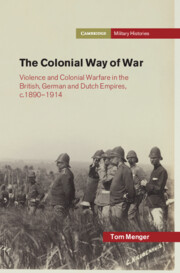Refine search
Actions for selected content:
3 results

The Colonial Way of War
- Violence and Colonial Warfare in the British, German and Dutch Empires, c.1890–1914
-
- Published online:
- 04 September 2025
- Print publication:
- 21 August 2025
Introduction
-
- Book:
- The Colonial Way of War
- Published online:
- 04 September 2025
- Print publication:
- 21 August 2025, pp 1-37
-
- Chapter
- Export citation
Chapter 8 - Milton and National Exceptionalism
- from Part II - Writing the Nation
-
-
- Book:
- The Nation in British Literature and Culture
- Published online:
- 20 July 2023
- Print publication:
- 10 August 2023, pp 137-154
-
- Chapter
- Export citation
